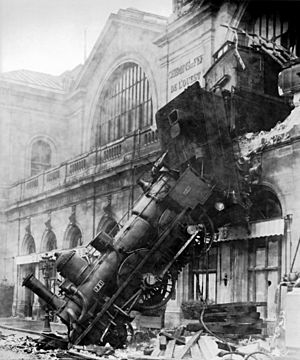Negligence facts for kids
In law, negligence is when someone gets hurt because another person or group wasn't careful enough. It's a type of legal problem called a tort. If someone is found negligent, it means they caused harm to another person or their things by not being careful.
Contents
What is a Negligence Case?
When someone starts a legal case about negligence, the person who is hurt and starts the case is called the plaintiff. The person or group being blamed is called the defendant.
Laws about negligence can be a bit different in various places. But for the plaintiff to win, they usually need to show four main things:
- The defendant had a duty to act in a certain way.
- The defendant broke that duty.
- The plaintiff was harmed or hurt.
- The defendant's broken duty caused the harm.
What is a Duty?
A person's duty is what the law expects them to do. Usually, the law says people must act reasonably. This means they should be careful and use good judgment. They should not be unfair to others.
Sometimes, the law gives people special duties. For example, a doctor has a special duty to care for their patients. In other cases, the law says people have no duty at all. For instance, in many places, there's no legal duty to rescue someone in danger. This is true even if helping would be easy and safe.
A very important case called Donoghue v Stevenson from 1932 helped create the modern law of negligence. It set up the idea of a "duty of care." This idea has been used in many countries around the world.
Here's what happened: May Donoghue and her friend were at a cafe. Her friend bought Mrs. Donoghue a ginger beer float. After drinking some, Mrs. Donoghue poured the rest over her ice cream. She was shocked to see the remains of a snail come out of the bottle! Mrs. Donoghue became very sick. She decided to sue the company that made the ginger beer, not the cafe owner.
The judges looked at the case. A judge named Lord Atkin said that the idea of "loving your neighbor" could also mean "not harming your neighbor" in a legal sense. He explained that "neighbor" means anyone who would be directly affected by your actions. This means you should think about how your actions might affect others.
Breaking a Duty
When people do not follow their duty, the law says they have breached or broken their duty. It means they did not act as carefully as they should have.
What is Harm?
A person can usually only start a lawsuit if they have been hurt. This hurt can be a physical injury, damage to their property, or another type of legal harm. The law explains what kinds of injuries people can sue about.
What is Cause?
A plaintiff can usually sue a defendant only if that defendant was the one who directly caused the harm. In many cases, it's easy to see who caused the injury.
However, sometimes people get hurt in unexpected ways. For example, imagine a careless driver hits an electric pole. The pole falls, and a whole neighborhood loses power. Because it's dark, someone two miles away trips and falls. The law would then decide if the careless driver caused that person to trip and fall.
Negligence in Everyday Life
The word negligence is also used outside of law. It means that someone has not been careful enough. For example, if you forget to water your plants and they die, you could say you were negligent in caring for them.
Images for kids
See also
 In Spanish: Negligencia (derecho) para niños
In Spanish: Negligencia (derecho) para niños
 | Stephanie Wilson |
 | Charles Bolden |
 | Ronald McNair |
 | Frederick D. Gregory |




